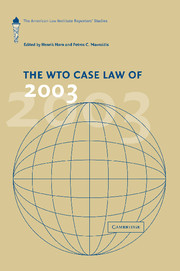Book contents
- Frontmatter
- Contents
- Foreword
- A Note on the American Law Institute
- American Law Institute Reporters
- 1 Introduction
- 2 European Communities – Anti-Dumping Duties on Imports of Cotton-Type Bed Linen from India (AB-2000-13, WT/DS141/AB/R:DSR 2003: III, 965): Recourse to Article 21.5 of the DSU by India
- 3 United States – Sunset Review of Anti-Dumping Duties on Corrosion-Resistant Carbon Steel Flat Products From Japan (AB-2003-5, WT/DS244/AB/R): A Legal and Economic Analysis of the Appellate Body Ruling
- 4 United States – Continued Dumping and Subsidy Offset Act of 2000 (WT/DS217/AB/R: DSR 2003:I,375)
- 5 European Community – Antidumping Duties on Malleable Cast Iron Tube or Pipe Fittings from Brazil (WT/DS219/AB/R: DSR 2003:VI, 2613)
- 6 United States – Final Determination with Respect to Certain Softwood Lumber from Canada (AB-2003-6, WT/DS257/AB/R)
- 7 United States – Definitive Safeguard Measures on Imports of Certain Steel Products (WT/DS259; WT/DS252; WT/DS248; WT/DS249; WT/DS251; WT/DS258; WT/DS254; WT/DS253: DSR 2003:VII, 3117)
- 8 Mexico – Measures Affecting Telecommunications Services (WT/DS204/R): A Comment on “El mess in TELMEX”
- 9 European Communities – Conditions for the Granting of Tariff Preferences to Developing Countries (WT/DS246/AB/R)
- 10 United States – Anti-Dumping Act of 1916 (Original Complaint by the European Communities) – Recourse to Arbitration by the United States under 22.6 of the DSU, WT/DS136/ARB, 24 February 2004: A Legal and Economic Analysis
- 11 Japan – Measures Affecting the Importation of Apples (AB-2003-4): One Bad Apple? (DS245/AB/R): A Comment
- Index
- References
8 - Mexico – Measures Affecting Telecommunications Services (WT/DS204/R): A Comment on “El mess in TELMEX”
Published online by Cambridge University Press: 06 July 2010
- Frontmatter
- Contents
- Foreword
- A Note on the American Law Institute
- American Law Institute Reporters
- 1 Introduction
- 2 European Communities – Anti-Dumping Duties on Imports of Cotton-Type Bed Linen from India (AB-2000-13, WT/DS141/AB/R:DSR 2003: III, 965): Recourse to Article 21.5 of the DSU by India
- 3 United States – Sunset Review of Anti-Dumping Duties on Corrosion-Resistant Carbon Steel Flat Products From Japan (AB-2003-5, WT/DS244/AB/R): A Legal and Economic Analysis of the Appellate Body Ruling
- 4 United States – Continued Dumping and Subsidy Offset Act of 2000 (WT/DS217/AB/R: DSR 2003:I,375)
- 5 European Community – Antidumping Duties on Malleable Cast Iron Tube or Pipe Fittings from Brazil (WT/DS219/AB/R: DSR 2003:VI, 2613)
- 6 United States – Final Determination with Respect to Certain Softwood Lumber from Canada (AB-2003-6, WT/DS257/AB/R)
- 7 United States – Definitive Safeguard Measures on Imports of Certain Steel Products (WT/DS259; WT/DS252; WT/DS248; WT/DS249; WT/DS251; WT/DS258; WT/DS254; WT/DS253: DSR 2003:VII, 3117)
- 8 Mexico – Measures Affecting Telecommunications Services (WT/DS204/R): A Comment on “El mess in TELMEX”
- 9 European Communities – Conditions for the Granting of Tariff Preferences to Developing Countries (WT/DS246/AB/R)
- 10 United States – Anti-Dumping Act of 1916 (Original Complaint by the European Communities) – Recourse to Arbitration by the United States under 22.6 of the DSU, WT/DS136/ARB, 24 February 2004: A Legal and Economic Analysis
- 11 Japan – Measures Affecting the Importation of Apples (AB-2003-4): One Bad Apple? (DS245/AB/R): A Comment
- Index
- References
Summary
Introduction
This chapter reviews the panel report on Mexico – Measures Affecting Telecommunication Services. The Panel considered claims by the United States that Mexico acted inconsistently with its obligations in respect to the liberalization of its market for telecommunication services. It is the first Panel to consider solely the rules agreed upon in the General Agreement on Trade in Services (GATS). It is also the first Panel to deal with the telecommunication services industry and its complex layers of legislation, in particular the rules agreed to in the Telecommunications Reference Paper (TRP) on pro-competitive regulatory principles. Viewed from this perspective, this report is, because of its potential as a precedent, of particular significance.
This case essentially revolves around the question of under what conditions foreign telecom operators can terminate calls in Mexico. The United States argued that the Mexican regulation of termination charges was not in conformity with the obligations contained in the TRP. It argued in particular that the termination charges were not cost-oriented and that Mexico had set up a cartel of telecom operators.
The following section of this chapter, Section 2, briefly discusses the Mexican regulation in dispute from an economic perspective and presents the legal framework of the dispute, focusing on the relevant provisions of the TRP. Section 3 analyzes whether and how the termination charges can be covered by the TRP. In this section, we first observe that the US operators do not supply cross-border services under mode 1, as the Panel stated in its report.
- Type
- Chapter
- Information
- The WTO Case Law of 2003The American Law Institute Reporters' Studies, pp. 188 - 219Publisher: Cambridge University PressPrint publication year: 2006



